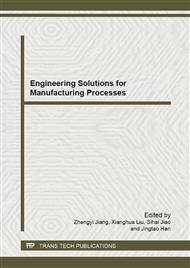p.1609
p.1614
p.1619
p.1631
p.1636
p.1642
p.1646
p.1650
p.1656
A Hybrid Population-Based Incremental Learning Algorithm for M-Machine Reentrant Permutation Flow-Shop Scheduling
Abstract:
In this paper, a hybrid population-based incremental learning algorithm (HPBIL) is proposed for solving the m-machine reentrant permutation flow-shop scheduling problem (MRPFSSP). The objective function is to minimize the maximum completion time (i.e., makespan). In HPBIL, the PBIL with a proposed Insert-based mutation is used to perform global exploration, and an Interchange-based neighborhood search with first move strategy is designed to enhance the local exploitation ability. Computational experiments and comparisons demonstrate the effectiveness of the proposed HPBIL.
Info:
Periodical:
Pages:
1636-1641
Citation:
Online since:
January 2013
Authors:
Price:
Сopyright:
© 2013 Trans Tech Publications Ltd. All Rights Reserved
Share:
Citation:


